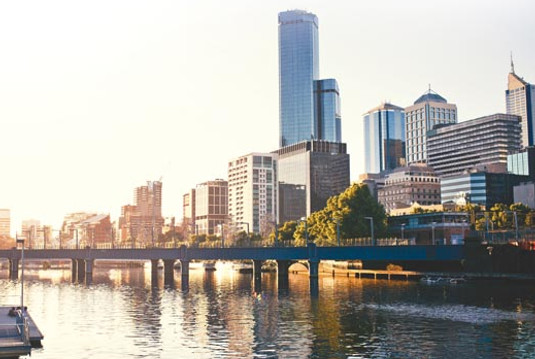Survivors & thrivers in 2020

We speak to practitioners from every corner of Australia about the effects of COVID-19 on their lives and practices.
Alix Nicholson
November, 2020
The notion that ‘we’re all in this together’ is one we’ve truly come to know this year. From the tragic bushfires that ushered in the new year to February’s floods in Queensland and New South Wales and, of course, the COVID-19 pandemic, 2020 has thrown a lot at every single one of us.
AACMA members across the country have braved the ongoing international health crisis, weathering the storm of government restrictions, changes in policy, reduced patient numbers, businesses closing and more. And though some parts of Australia are finding their way back to some sense of normalcy, others – like Victoria – are still very much in the thick of the crisis.
We sat down with AACMA member practitioners from all reaches of our nation to talk about how the pandemic has affected their clinics, and what their hopes are for acupuncture and TCM as we move into
the future.

Mary Menotti, NT
After practicing in the regional area of Alice Springs for 20 years, Mary Menotti considers herself fortunate – not only for the receptive community who share her Northern Territory home, but also that the area has remained largely untouched by COVID-19. “Initially, there was a decline in client numbers, due to uncertainty and a lack of clarity. But once the message got out that practice was open and clients knew safety protocols had been introduced, they seemed at ease,”
she shares.
While the pandemic situation in the NT hasn’t been as dire as some other areas, Mary nevertheless implemented extra safety and cleaning procedures at her clinic, ensuring patients were well taken care of. “I adjusted my appointment times, leaving 15 minutes between each client to eliminate the chance of them meeting in the reception area,” she explains. “I wiped down the table and door handles, had the clients wait outside until they were invited in, and I also encouraged them to wear gloves.” Mary also got the message out there that, as an Allied Health professional, she was open for business, adjusting her answering machine and reaching out to clients via text.
And while the chance of COVID-19 infection didn’t seem to play on the minds of her patients, Mary adds that the Alice Springs community at large was highly concerned for the welfare of the remote Northern Territory indigenous communities. “Everyone – health professional or not – was so concerned with the notion that this disease would find its way to the communities,” Mary shares. “Because there is so much comorbidity amongst the indigenous people, the consequences would’ve been devastating. People on the ground, health professionals, clients, politicians – everyone housed this concern.”
Also top of mind for Mary and some of her colleagues was how they could step up and help other health professionals around her. “You saw on the news the tired, distressed emergency clinical and non-clinical staff and I thought, how can I support the emergency department staff here in Alice?” she says, explaining that she reached out to the very receptive hospital staff about providing services such as extended practice hours for those on the front lines.
While it didn’t eventuate this time around, thanks to the NT’s quick and effective control of the spread of the coronavirus, it’s certainly an idea worth exploring for the future – and one that could also help boost the profile of Chinese medicine in the greater health community, which Mary is concerned has “somewhat stagnated … due to the immediacy of COVID-19”.
“I think there is scope for TCM to step up and partner with and support those health workers that are under extreme pressure,” Mary says of Chinese medicine’s role in future health crises. “Here in Alice Springs, we are ready to step up.”
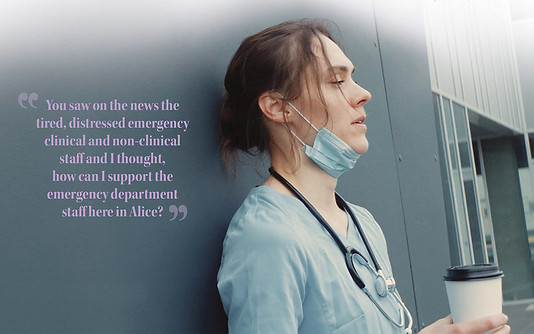
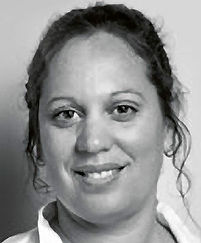
Carolyn Masson, WA
Western Australia’s East Fremantle, in the suburbs of Perth, co-founder of the Chinese Medicine Centre (chinesemedicinecentre.net.au) Carolyn Masson works alongside several other Chinese medicine trained practitioners. And while WA hasn’t experienced the large numbers of COVID-19 cases that some other states have seen (to date, around 700 cases have been reported in WA), the pandemic has still had an impact on local businesses – including Carolyn’s.
“Our patients in the first wave were too scared to come and have treatment,” she explains, sharing that they closed down for a month during the early days of the pandemic in Australia. “We felt that the only responsible action to take was to close the clinic, especially for our elderly or vulnerable patients.”
But now that life seems to be on its way back to normal again in Perth, Carolyn hopes that Chinese medicine can come to the forefront in battling this and any other health crises facing the world in the future. “I believe our industry could have a very positive contribution for the treatment of COVID-19 or any future epidemics,” she shares. “After all, Ebola was successfully treated with Chinese herbal medicine.”
As TCM has some of the largest and oldest medical volumes on the treatment of cold diseases (eg. the Shang Hun Lun and many more), Carolyn’s hope is that TCM practitioners can contribute some of this centuries-old knowledge and the wisdom found within for the betterment of health outcomes going forward. After all, the use of Chinese medicine in conjunction with conventional treatment is already a regular part treatment in China’s hospitals.
“If only the Western medical system could open up to some of our ways – after all, conventional medicine is still so young and is still in its early stage of development. Doesn’t everyone’s great- great-grandparents pass down some
knowledge/values?”

David Lilliebridge, NT
While many parts of Australia have been on high alert during the pandemic, the Northern Territory has been fortunate to escape relatively unscathed, with only 33 cases of COVID-19 in the state to date. “Luckily, up here in the Top End, we haven’t really been affected that much by restrictions,” shares David Lilliebridge, whose practice, Four Treasures Traditional Chinese Medicine (fourtreasures.com.au), is in Parap, just outside Darwin’s CBD. The general practice has a particular focus on fertility and IVF support, along with musculo-skeletal and sports injuries, and David – who has an interest in cosmetic acupuncture – utilises patent herbal formulas as well as acupuncture to treat his patients.
“We were actually asked to stay open during the peak of the first wave of COVID-19 as an essential health service, which we did,” he shares, adding that the additional safety measures put in place at the onset of the pandemic have remained. “We continue to practice safe treatment options and deep cleaning to maintain a healthy environment and our waiting room has changed to accommodate social distancing,” he tells.
It seems ‘alert but not alarmed’ might best describe locals’ approach to treatment during this time, too. “All patients have been very aware of the social distancing rules which is the ‘new norm,’” he shares. “We have been fantastically lucky up here in the NT and have had no community spread of COVID-19. Life has sprung again and almost all the social venues are open and running again so most concerns have eased.”
To this end, he adds, “it’s been business as usual and has been very busy these past couple of months”. In fact, there may even be a positive to have come from the situation for the Darwin community: “People seem to be more focussed on their health and wellbeing lately,” David explains.
As life continues almost as normal up in David’s part of the NT, his main hopes for the future are simple, but meaningful. “I hope to continue to have a thriving practice and to be of service to my patients and to the general community,” he shares. “I hope this continues throughout the remainder of the year and into the foreseeable future. I try not to focus on the fears and remain positive!”

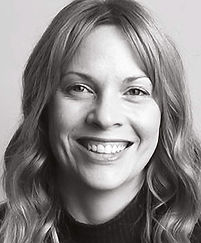
Reanna Mueleman, QLD
Reanna Mueleman and her partner Alastair run a general practice up in sunny Coolangatta, on Queensland’s Gold Coast. “There isn’t much we don’t treat!” she shares of their clinic, Being Acupuncture (beingacupuncture.com.au; Instagram/@being.gc). “Predominantly, we see a lot of patients with musculoskeletal and digestive complaints, fertility and anxiety. I’m solely an acupuncturist, and Alastair treats with raw herbs and acupuncture.”
Fortunately for the pair, their practice has remained largely unaffected by the COVID-19 pandemic compared to other parts of the country – although their proximity to the Qld/NSW border and the governments’ associated travel restrictions have created a unique set of issues for them.
“Being situated on the Qld/NSW border, the restrictions have been a huge hassle for both us and our clientele,” Reanna explains, adding that patients have been having trouble getting to the practice for treatment. “We have found that our clients have experienced difficulties travelling to the clinic.”
With 1162 COVID-19 cases in Queensland at the time of going to print, the north-eastern state has fared better than some during the pandemic, but don’t for a second think that has encouraged complacency – far from it, with Reanna explaining the measures they have put in place to increase safety at their clinic. “During these times we have changed our appointment times from 1 hour to 1.5 hours, which allows additional time for hygiene,” Reanna tells, “ensuring that we service our clients to the highest standard.” And while her clients have understandably been worried about the pandemic itself, “many of them seem to be concerned with the possibility of financial pressures”, Reanna adds.
So, where to from here? As the race to create a COVID-19 vaccine continues, Reanna is hopeful that Chinese medicine will find a more secure foothold in people’s everyday health and wellbeing. “My hope for the future is that the Chinese medicine industry and the medicine itself flourishes,” she says, “with people in the community understanding the value of their health during this time.” Her biggest concern in achieving that goal, however, comes in the form of a question: “Will the economy be able to support people to do this?”

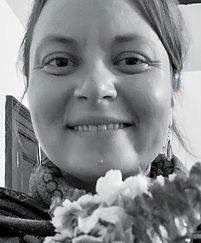
Anna Helms, TAS
While the pandemic has been wreaking havoc in many parts of the world, down in Tasmania, where 230 COVID-19 cases have been reported, business has been abundant for Anna Helms. At Golden Lotus Acupuncture (goldenlotusacupuncture.com.au) in Hobart’s CBD, Anna has a particular focus on fertility and pregnancy support – and says her clinic is “overflowing with these clients at the moment”.
At the start of the COVID-19 health crisis, Anna took some time away from the practice. “I initially voluntarily took six weeks off earlier this year, when it all started to look a bit hairy,” she shares, “but since opening up my doors again after that it’s been busier than ever. We’ve been very lucky in Southern Tassie that we haven’t been affected by stage-4 lockdowns.”
When Anna did reopen, of course, she followed all the recommended safe-practice guidelines and business procedures to ensure a clean and secure environment for her patients, and let them know they could still receive treatment. “Everyone has been fantastic and understanding,” she says, “although a lot of clients were surprised that we were able to remain open” – a timely reminder of the need for client education around what it means to be Allied Health. “Most of my clientele are regulars so we already have strong rapport and trust built; and for new clients, making them aware of what we are doing to keep them and our community safe has helped them feel comfortable and confident in continuing their treatments, and referring their friends and family.”
While Anna has been fortunate enough to see a steady stream of business during the pandemic, she understands the need for practitioners to look after themselves, too – especially now. “I’m very aware of making sure I also pace myself and look after my own mental health as the clinic becomes busier and there’s more demand for our services,” she shares. “I think we need to be very careful not to burn ourselves out, and maintain clear boundaries and self-care, as there is a lot of collective stress and anxiety present in these uncertain times.”
With Tasmania’s borders reopening to several states on October 26, and government financial support coming to an end for some, the landscape may be set to change once again – though Anna’s hopeful that things will remain positive. “I’m not concerned my practice will see a significant downturn, but we’ll have to see how it all unfolds over the next year,” she says. “I think people are aware of maintaining their health and wellbeing more than ever now and that they will continue to seek support to manage stress and mental health as well.”
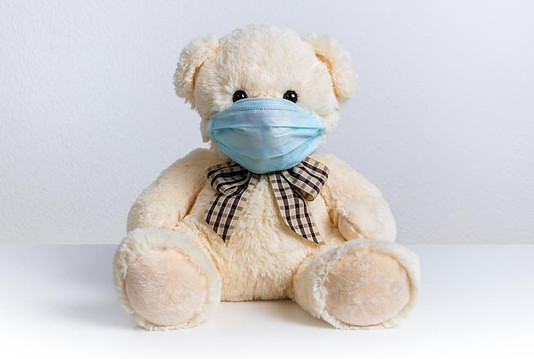

Yifan Yang, NSW
With a focus on acupuncture and Chinese herbs, Yifan Yang practices in the inner city of Sydney, NSW – a state that has struggled with the second-highest number of COVID-19 cases in the country, more than 4130 at time of going to print.
Yifan explains that reduced business due to the pandemic has had – and continues to have – an impact on his practice, noting patients’ fears of “COVID-19 and the related impact” have led him to reduce his practice hours in an effort to keep the business afloat. “We’re working three to four days a week just to maintain a basic income,”
Yifan shares.
While many aspects of life have returned to some sense of normalcy in NSW, community transmission is an ongoing issue, with handfuls of cases popping up and reminding everyone that the pandemic is far from over. The NSW government insists health services continue to implement processes that minimise risk of infection and transmission, “including screening clients for symptoms or contact with a person with suspected or confirmed COVID-19, identifying and excluding unwell staff members, physical distancing measures where feasible e.g. waiting rooms, and infection control procedures including access to soap and water or hand sanitising and enhancing environmental cleaning”, reads the NSW Government Health website.
While safety measures continue, Yifan is simply holding out for a brighter future; when COVID-19 “passes over and [life can] resume to normal”.

Clare Pyers, VIC
With around 20,300 cases of COVID-19, Victoria has undeniably borne the brunt of the COVID-19 pandemic in Australia. Clare Pyers (clarepyers.com), whose practice is in the usually bustling Melbourne suburb of Prahan, knows all too well the realities facing both practitioners and patients right now.
“We’ve had stay-at-home orders for seven months here, aside from a few weeks in the middle of the year. It’s been challenging,” she admits. “In March, when things first closed down, everyone went into panic mode. A lot of my regular clients either lost work or had insecure financial positions, so my patient numbers dropped right off.”
Business started to pick up again when restrictions began to ease in May, and Clare had reopened by June to a busy couple of months. But when the stage-4 restrictions were thrust into place at the start of August as a result of the Victoria’s frightening second wave, many practitioners were forced to shut down. “It’s been a really confusing time trying to navigate the government guidelines and the policy updates around who was allowed to work and who wasn’t,” Clare explains. “It took us a while to get clarity around Allied Health and whether we’d be allowed to see patients face to face, and under what circumstances.” The harsh restrictions saw patient numbers dropping by around 90 percent in many practices (stage-4 lockdown meant practitioners could only treat people with critical or emergency care needs face to face). “It’s been very frustrating and heartbreaking for us as practitioners, especially during stage 4, when people really needed us and we weren’t able to see them because they didn’t fit the criteria,” tells Clare. “It was really hard for us to have to turn people away.”
Fortunately for Clare, telehealth has been an important part of her practice for years, so she was able to continue seeing her regular overseas and international patients, and could transition regular patients to the online system. “Initially, I think people planned to hold off getting treatment until it was all over,” she shares. “But in the second lockdown, I think a lot of people thought, ‘Well I’ve got to do something about my health, I can’t come and see you so I’ll just do telehealth.’ So that picked up for me, which was good – but still not comparable to what I’d usually be doing.”
Since the latest round of changes to restrictions, Victorian practitioners can now see a wider range of people and offer routine care, Clare explains, which has allowed her to open her doors back up to many more clients.
As far as the future is concerned, the mental health implications have Clare particularly concerned. “There’s a tsunami of mental health problems down here at the moment,” she shares. “It’s been such a long time and everyone is really suffering. I think that a significant number of people will end up with long-term mental health problems as a result of these lockdowns.” But, she adds, Chinese medicine is uniquely positioned to help with that, too. “We’re really well equipped to deal with all aspects of a person’s health and wellbeing – including mental health.”
If there’s a positive to come from all of this, it’s been the incredible support Clare and her fellow Victorian practitioners having been giving each other. “People have been reaching out to each other in a lot of the online forums, and it's been really nice that we've been able to support each other during this time,” she says. “It’s really highlighted the importance of community.”
